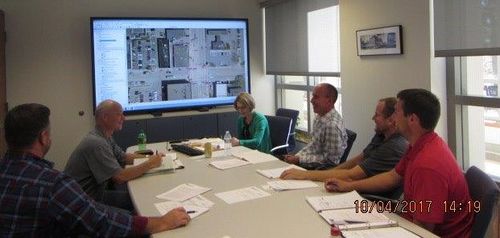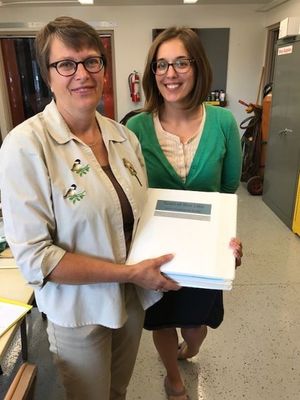
Phase II MS4 audit process
Contents
Phase II MS4 audit process
What to expect during a compliance evaluation of your stormwater program
The U.S. Environmental Protection Agency (EPA) mandates the Minnesota Pollution Control Agency (MPCA) to evaluate Municipal Separate Storm Sewer System (MS4) permittees for compliance with the MS4 General Permit. The MPCA does this through compliance audits.
Through the MS4 permit, the MPCA relies on permittees to include specific requirements into their Stormwater Pollution Prevention Program (SWPPP) to reduce pollutants entering storm sewer systems. During an audit, MPCA staff and permittees discuss the appropriateness of their best management practices (BMPs) and progress towards achieving goals that were identified by the permittee when they applied for, or renewed, their MS4 General Permit.
Don't like reading? Check out our YouTube video on the audit process instead!
Audit purpose and types
Audits serve many purposes and should be beneficial to you, local MS4 staff, and the MPCA.
- Determine compliance with the MS4 General Permit. The MPCA staff will evaluate the materials provided prior to, during, and after the audit and responses to the audit questions to determine permit compliance.
- Technical assistance. The audit is a good opportunity for you and other local MS4 staff to meet the MPCA staff members and ask questions regarding the MS4 General Permit, your local program, or how other MS4s are implementing their SWPPP.
- Assist with permit revisions. The MPCA will use feedback and input gathered during the audit to inform future permit revisions.
There are three main reasons that MPCA staff will conduct an audit:
- Routine. These audits are to meet the EPA evaluation mandate and are the majority of the audits conducted.
- Construction stormwater complaints. If there have been multiple complaints related to construction site activities in one jurisdiction, either observed by MPCA inspectors or received by the public, the MS4 may be flagged for an audit.
- Duty Officer or other citizen complaints. If there have been multiple Duty Officer complaints or other citizen complaints related to spills, illicit discharges, or other impacts to stormwater, the MS4 may be flagged for an audit.
Your MPCA auditor should inform you of the reason for the audit during the audit.
Notification process
If your MS4 is selected to be audited, an MPCA staff member will reach out to the primary MS4 contact indicated on the most recently submitted Annual Report to determine the audit date. MPCA staff will follow up with an email verifying the audit date and include an audit agenda, formal audit notice letter, and a checklist of items that you should gather in preparation for the audit. The items requested on the checklist and supporting documentation will need to be sent to the MPCA staff prior to the audit, if requested. Examples of information that the MPCA may request include:
- public outreach materials,
- organizational chart(s),
- staff training documentation,
- ordinances or other regulatory mechanisms,
- pond maintenance plans and procedures,
- a list of active construction sites that may be visited,
- inspection forms and findings
- site plan review documentation
You can find a list of all documentation that should be kept as part of your SWPPP in the Minnesota Stormwater Manual.
Length of audits
The length of the audit will range from half a day to a whole day depending on the depth and breadth of the audit, how prepared you and other MS4 staff are, the complexity of your stormwater program, and whether the audit includes a field component. Your MPCA auditor will let you know the expected length of the audit during the notification process.
How to prepare for the audit
Most of your preparation for the audit will be gathering the documents requested in the Phase II MS4 Checklist and sending them to your MPCA auditor by the deadline.
Most likely, the audit will be at a location of your choosing, generally within your jurisdiction. Therefore, you should coordinate with other municipal staff or staff from partnering organizations if you would like them to be present at the audit. Beyond that, no other formal preparation is required.
The MPCA auditor will review the documents submitted and develop questions that are specific to your MS4 and SWPPP.
To see example audit questions, see here. These are questions that MPCA staff may ask during the audit, but they will also ask questions specific to your stormwater program.
What to expect during the audit
Regardless of the reason for the audit, the format will be the roughly the same. Every audit will be related to any or all of the six minimum control measures (MCMs).
During the audit, MPCA staff will evaluate permit compliance and program effectiveness based on three areas:
- responses to the audit questions
- whether or not your stormwater program has met the goals of its SWPPP
- other outcomes that your stormwater program has achieved
The audit allows you to describe your unique approach to implementing your SWPPP. Your MPCA auditor will ask questions from a standard questionnaire form to ensure all topics are covered consistently for all permittees. In addition, your auditor will ask questions specific to your MS4 questions if there are areas that the MPCA staff feel need further clarification. The audit will be conversational and will give you ample opportunity to explain your answers and provide background information. You will also be able to ask the MPCA staff questions you have as well.
To see example audit questions, see here. These are questions that MPCA staff may ask during the audit, but they will also ask questions specific to your stormwater program.
Field Component
Some audits include a field component. You auditor may want to visit active construction sites, stormwater facilities, or municipally operated facilities. If this is the case, MPCA and any appropriate MS4 staff will visit and evaluate these sites together. The auditor will let you know while scheduling the audit if there is a field component.
Post-audit activities
Immediately following the audit, the auditor will provide a debrief in an exit interview to provide a preliminary assessment of your stormwater program based on responses to audit questions, permit requirements, and your SWPPP.
MPCA staff will send you an official audit report, generally within one month of the audit. The audit report will summarize compliance status and may include recommended or required actions for you to take if issues were identified or if the MPCA feels that there are aspects of your stormwater program that could be improved.
The primary function of the audit is to assess and improve SWPPPs, but, as with all regulatory programs, there is potential for enforcement actions with financial penalties for alleged violations. If alleged violations are observed, you will have an opportunity to respond to the MPCA in writing.
For more information, call 651-296-6300 or 800-657-3864 and ask for MS4 stormwater permit program staff. Or see here for the MPCA staff assigned to your MS4.
This page was last edited on 5 December 2022, at 23:26.

